Test Answers on APUSH Unit 4 Review
Unlock all answers in this set
Unlock answersquestion
War of 1812
answer
War which West and South wanted, but Northeast did not; between the United States and England which was trying to interfere with American trade with France
question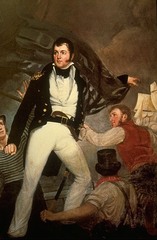
Oliver Hazard Perry

answer
Won a battle at Lake Erie and forced the British out of Detroit
question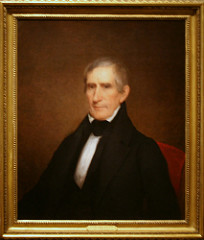
William Henry Harrison

answer
His forces defeated the British at the Battle of the Thames
question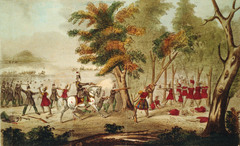
Battle of the Thames

answer
Harrison's troops defeated the British at this battle; Tecumseh was killed
question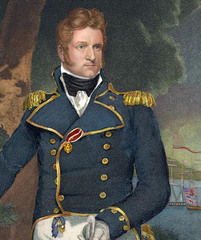
Captain Thomas MacDonough

answer
Prevented British from invading New York
question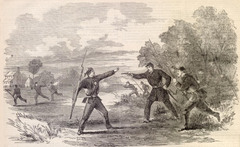
Bladensburg

answer
Brithish troops overran Americans and after this the British burnt down the capitol (Washignton D.C.)
question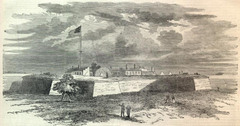
Fort McHenry

answer
Where the British were stopped on their way to Baltimore
question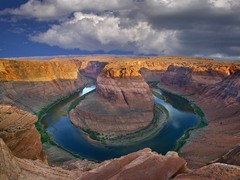
Battle of Horseshoe Bend

answer
Where Andrew Jackson defeated the Indians in Alabama
question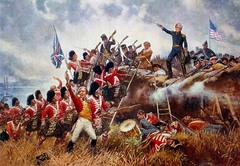
Battle of New Orleans

answer
Largest battle of the war, won by Jackson in January 1815
question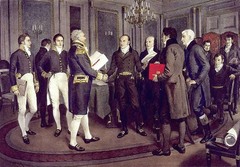
Treaty of Ghent

answer
was an armistice (a cease-fire) that ended the War of 1812
question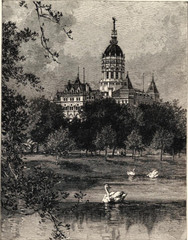
Hartford Convention

answer
New England's goal at the meeting was to decide what to do about the war
question
Rush-Bagot agreement
answer
between the U.S. and England limited both sides' naval power on the Great Lakes; treaty showed that England and the U.S. were getting along
question
Washington Irving

answer
Wrote Rumpelstiltskin and The Knickerbocker Tale
question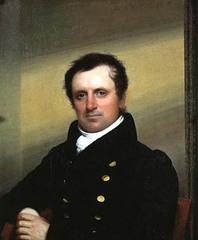
James Fenimore Cooper

answer
Wrote The Leatherstocking Tales which included The Last of the Mohicans
question
The American System
answer
an economic plan for the country: (B.T.T.) 1. Strong banking system. 2. Set up a protective tariff to boost American industry. 3. Build a strong transportation network of roads and canals.
question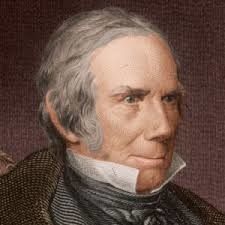
Henry Clay

answer
Speaker of the House, who tiated the American System
question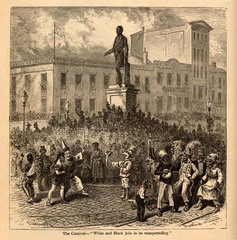
Panic of 1819

answer
cause of this was over-speculation (buying too much on credit) in land; the West was hit the hardest
question
Cumberland Road
answer
Example of a better road; this one went to Illinois
question
Steamboat
answer
This invention made two-way river travel possible
question
Land Act of 1820
answer
allowed buyers to purchase 80 acres at $1.25 per acre (as a minimum)
question
Wildcat banks
answer
gave easy credit; these banks printed their own paper money then lent it out liberally to anyone wanting to buy land
question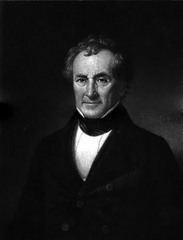
Tallmadge Amendment

answer
limit slavery in Missouri: • no more slaves be allowed into Missouri • that slaves born to Missouri slave parents would gradually emancipated
question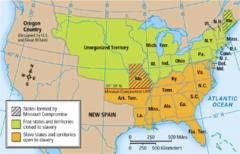
Missouri Compromise

answer
• Missouri would be admitted as a slave state; Maine would be admitted as a free state • All new states north of the 36°30' line would be free, new states southward would be slave
question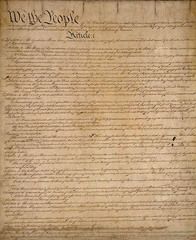
McCulloch vs. Maryland (1819)

answer
The "Elastic Clause Case" Said that the Constitution had been written in more general terms rather than specific, and therefore could be interpreted.
question
Cohens vs. Virginia (1821)
answer
The "Lottery Case" Supreme Court showed it had the power to review state court decisions
question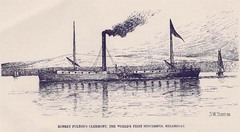
Gibbons vs. Ogden (1824)

answer
The "Steamboat Case" The Constitution says that only Congress can regulate interstate trade
question
Fletcher vs. Peck (1810)
answer
The "Land Scam Contract Case" The Supreme Court said a contract is a contract and the Constitution says it can't be broken by state laws.
question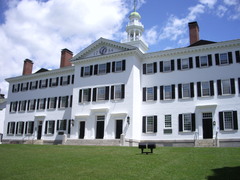
Dartmouth College vs. Woodward (1819)

answer
The "College Charter Case" The Supreme Court said the charter was a contract and, like Fletcher, states could not encroach on contracts
question
Treaty of 1818
answer
made with England about Canada border 1. The treaty drew a border line at 49° from Lake of the Woods (MN) westward to the Rocky Mountains. 2. The prosperous fishing waters of Newfoundland would be shared. 3. For the time, Oregon would be jointly occupied. and over the Canada border
question
Florida Purchase Treaty
answer
made with Spain • America paid $5 million and got Florida • Spain gave up a claim to Oregon and America gave up a claim to Texas • the southern limit of Oregon was set at 42° latitude.
question
George Canning
answer
offered a deal the American minister in London: proposed the U.S. and England make a statement they'd not grab any Latin American land
question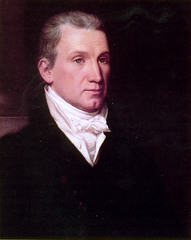
Monroe Doctrine

answer
• European non-colonization of the Americas and non-intervention • It was a "KEEP OUT" sign.
question
Russo-American Treaty (of 1824)
answer
set the southern boundary of Russian land at 54° 40'
question
land butchery
answer
when a farmer would wear out a piece of land, then just move on to find more
question
Kentucky bluegrass
answer
This began to thrive after settlers burnt off the tall cane grass
question
nativists
answer
those born in America and were opposed to immigrants
question
potato famine
answer
resulted in 2 million Irish dieing
question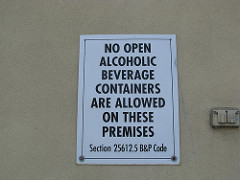
temperance movement

answer
movement to ban alcohol
question
Industrial Revolution
answer
time when machines and factories began to replace handmade products
question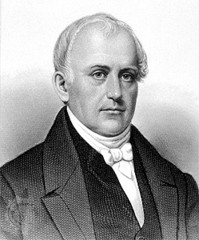
Samuel Slater

answer
textile worker in England who memorized the plans of the factory so he could build one in America
question
Moses Brown
answer
financially backed Samuel Slater
question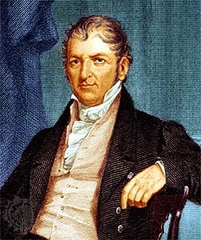
Eli Whitney

answer
invented the cotton gin which separated the fiber from the seed (1793)
question
Tariff of 1816
answer
"protective tariff" (one to boost foreign goods and therefore make American goods look cheaper)
question
interchangeable part
answer
machine-made components of anything could simply be swapped out if one broke
question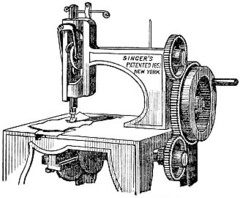
Elias Howe and Isaac Singer

answer
invented the sewing machine
question
limited liability corporation
answer
companies ensured that if the company went bad, an investor could lose only what he'd invested (not everything he owned)
question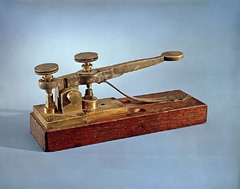
Samuel Morse

answer
invented the telegraph
question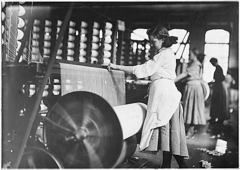
Lowell, Massachusetts

answer
well-known as employing young women to work in its textile factories
question
Catharine Beecher

answer
leading proponent who pushed for women to enter teaching
question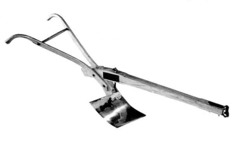
John Deere

answer
invented the steel plow
question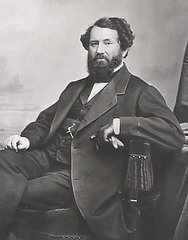
Cyrus McCormick

answer
invented the mechanical mower-reaper
question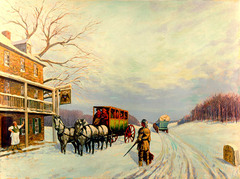
Lancaster Turnpike

answer
(a hard-surfaced highway) went from Philadelphia to Lancaster, PA
question
Cumberland Road (National Road)
answer
went from Maryland all the way to Illinois
question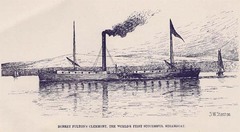
Robert Fulton

answer
credited with building the first steamboat, the Clermont (1807)
question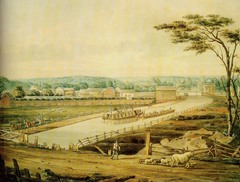
Erie Canal

answer
The granddaddy of canals
question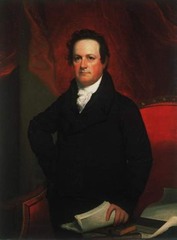
Dewitt Clinton

answer
headed up Erie Canal and built using only state money
question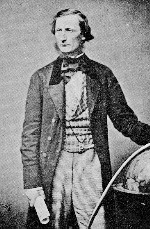
Cyrus Fields

answer
laid a telegraph wire across the Atlantic Ocean
question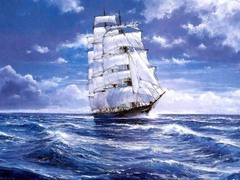
clipper ships

answer
ships that were used to haul cargo to foreign nations
question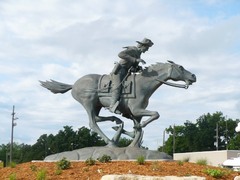
Pony Express

answer
carried mail from Missouri to California
question
transportation (revolution)
answer
revolution where people wanted to link the West with the rest of the nation
question
division of labor
answer
The North: manufacturing The South: cotton for export The West: grain and livestock
question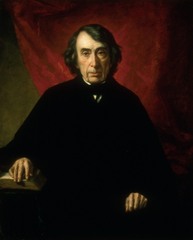
Roger Taney

answer
said that "the rights of a community" were greater than a corporate contract
question
overall standard of living
answer
rose during this time period
question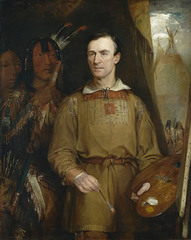
George Caitlin

answer
student and painter of Native American life who was among the first advocates for the preservation of nature; proposed the creating of a national park
question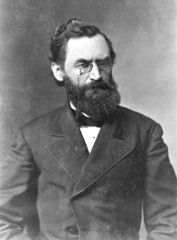
Carl Schurz

answer
a relentless foe of slavery and public corruption
question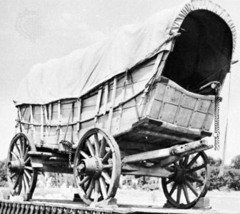
German Influence (on American Culture)

answer
• Conestoga wagon • Kentucky rifle • Christmas tree • Kindergarten
question
Alexis de Tocqueville

answer
The church-going nature of America was noted by this French observer Also noted that rape in America was punishable by death, whereas in his home of France it was usually overlooked
question
Deism
answer
sprang out of the Enlightenment (AKA "Age of Reason") and was based on scientific or logical reasoning rather than faith
question
Unitarian
answer
religion drew followers even farther away from Christianity • Believed God existed in 1 person ("uni"), but not in the Holy Trinity. • Rejected the divinity of Christ. • Believed people were essentially good at heart, not born under "original sin." • Believed people were saved through "good works", not through faith in Christ. • Attracted intellectual types, notably Ralph Waldo Emerson
question
Millerites
answer
• aka Adventists • predicted Christ's return on October 22, 1844 • When this prophesy failed to materialize, the movement lost credibility
question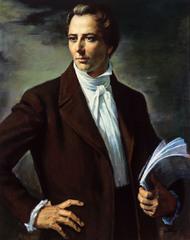
Joseph Smith

answer
claimed to have found golden tablets in NY with the Book of Mormon inscribed on them
question
Brigham Young
answer
took over and led the Mormons along the "Mormon Trail" to Utah after Joseph Smith was killed
question
Horace Mann

answer
• known as the "Father of Public Education" • pushed for free compulsory education and education
question
Noah Webster

answer
Blueback Speller and dictionary
question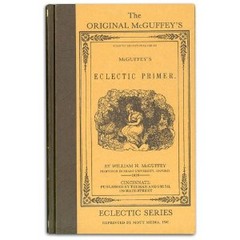
William H. McGuffey

answer
wrote the McGuffey's Reader
question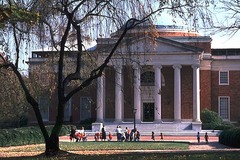
University of North Carolina

answer
first state-supported university
question
Dorothea Dix

answer
sought and got improved treatment for the mentally insane
question
American Peace Society
answer
Pacifists led by William Ladd
question
American Temperance Society
answer
• founded in Boston, 1826 • used a variety of methods to encourage temperance (discourage drinking)
question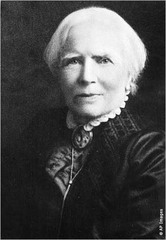
Dr. Elizabeth Blackwell

answer
became the first female doctor
question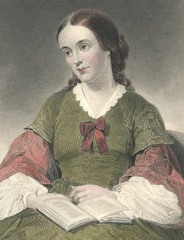
Margaret Fuller

answer
edited a transcendentalist journal
question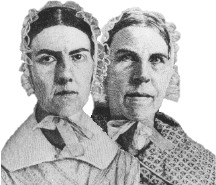
Grimke sisters

answer
Sisters who pushed for the abolition of slavery
question
Seneca Falls Women's Rights Convention (1848)
answer
• It wrote a "Declaration of Sentiments" arguing that "all men and women were created equal" • It demanded female suffrage • Neither of these things happened anytime soon, but the women's rights movement was born
question
Robert Owen

answer
started New Harmony, Indiana (1825)
question
Brook Farm
answer
• Started in Massachusetts (1841) • It attracted Transcendentalist intellectuals
question
Oneida Community
answer
was communal and embraced free love, birth control, and selecting parents to have planned children
question
Shakers
answer
• were begun by Mother Ann Lee as a religious sect • stressed simplicity in their lives and separated the sexes
question
Thomas Jefferson
answer
invented a new and better plow
question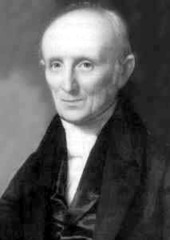
Nathaniel Bowditch

answer
wrote on navigation
question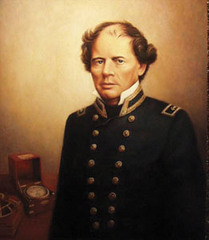
Matthew Maury

answer
studied the ocean winds and currents
question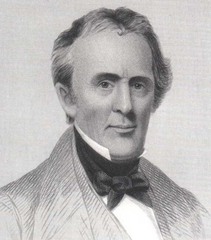
Benjamin Silliman

answer
Yale chemist and geologist for 50+ years
question
Louis Agassiz

answer
Harvard biologist who stressed original research over rote memorization
question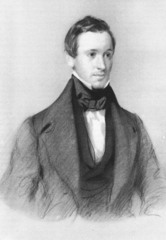
Asa Gray

answer
Harvard botanist and was a pioneer of botany
question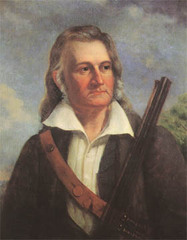
John Audubon

answer
early naturalist who painted birds with precise details
question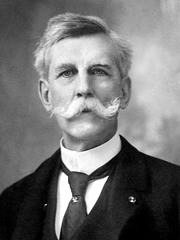
Dr. Oliver Wendell Holmes

answer
said that if all the medicines were thrown into the sea, the people would be better off and the fish worse
question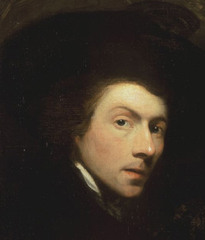
Gilbert Stuart

answer
painted many portraits of George Washington
question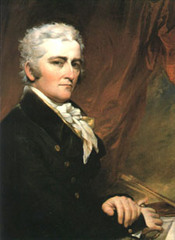
John Trumbull

answer
painted scenes of the Revolutionary War
question
Corrupt Bargain
answer
• Election of 1824 • Henry Clay supported Adams and swayed house vote • Adams won and appoined Clay as Secretary of State • Appeared as if Adams bribed Clay with position of Sec. of State
question
universal white male suffrage
answer
all white men could vote
question
John Quincy Adams

answer
• President (1824-1828) • Puritanical Yankee • Pushed nationalist programs to build: (a) roads and canals (b) a national university (c) a national observatory
question
Old Hickory
answer
Nickname given to Andrew Jackson by his soldiers
question
Spoils System
answer
rewarded political party workers with government jobs
question
Samuel Swartwout
answer
was put in charge of the customs duties at the port of New York and later ran off with over $1 million
question
Tariff of Abominations
answer
Tariff passed by Congress in 1828 that favored manufacturing in the North and was hated by the South
question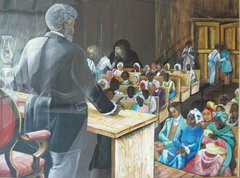
Denmark Vesey

answer
free black who led a slave rebellion in Charleston, SC in 1822
question
South Carolina Exposition
answer
took the Virginia and Kentucky Resolutions to the next level; said that the states could nullify the tariff
question
Tariff of 1832
answer
removed the worst parts of the Tariff of 1828 (AKA Tariff of Abominations)
question
Force Bill
answer
authorizing the president to use force if necessary to collect the tariff
question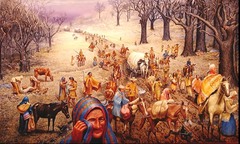
The Trail of Tears

answer
The forced movement of Cherokee Indians in 1838 to the land west of Mississippi River forced by the U.S. Army; it lasted 116 days and was 1,000 miles long, many Indians died along the way
question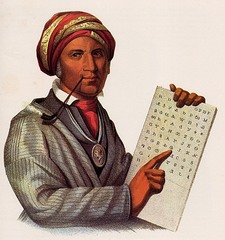
Sequoyah

answer
devised a Cherokee alphabet so they could write
question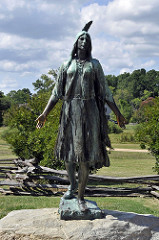
Five Civilized Tribes

answer
Cherokee, Creek, Choctaw, Chickasaw, and Seminole
question
Society for Progating the Gospel Among the Indians
answer
example of an attempt to assimilate Indians into white society
question
Jackson's Policy on Indians
answer
Indians and whites couldn't live together peacefully so the Indians were to be removed to the West
question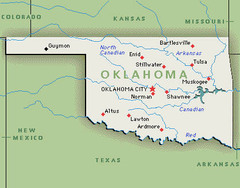
Indian Territory

answer
Oklahoma
question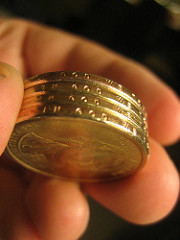
hard money

answer
actual metal money
question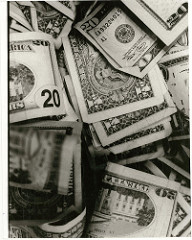
soft money

answer
paper money
question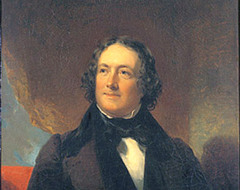
Nicholas Biddle

answer
President of Bank of United States who carried out bank policies of (a) coining hard money and (b) cracking down on western "wildcat banks" by calling in loans
question
pet banks
answer
another name for wildcat banks
question
Whig Party
answer
Political Party: • Disliked Andrew Jackson • Liked Henry Clay's American System
question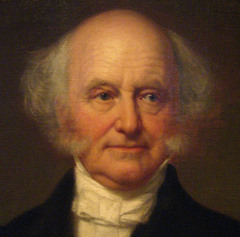
Martin Van Buren

answer
won the election of 1836
question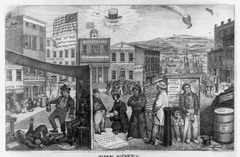
Panic of 1837

answer
Second economic downturn of the 1800s Caused by: • Over-speculation, especially in land • Jackson's bank policies and resultant chaos • Jackson's "specie circular" • Failure of crops • Failure of two major banks in England
question
Divorce Bill
answer
the government should separate itself from banking altogether
question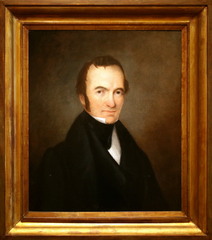
Stephen Austin

answer
led the "Old 300" families into Texas with the conditions that (1) they must become Mexican citizens, (2) they must become Catholic, and (3) no slavery was allowed
question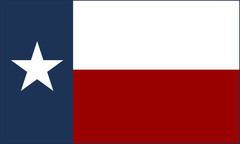
Lone Star Republic

answer
nickname for Texas after it won independence from Mexico in 1836
question
Battle of the Alamo
answer
1836 attack on the a mission in San Antonio by Mexican forces during the Texas revolution
question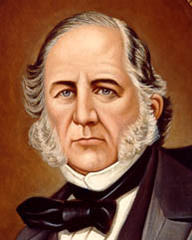
Sam Houston

answer
Texas President who led his troops to the Battle of San Jacinto
question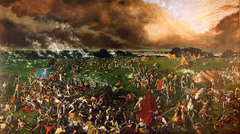
Battle of San Jacinto

answer
(1836) Final battle of the Texas Revolution; resulted in the defeat of the Mexican army and independence for Texas
question
slavocracy
answer
Term the North used to describe the Slaveholding South and its "schemes" to gain more slave-land.
question
New Democracy
answer
new fashion of governement; common white man's government - all white men could vote; belief in power to the people
question
Political Parties of 1840
answer
The Democrats were the common man's party. The Whigs were the upper class's party.
question
2nd Bank of the United States
answer
It was a federal establishment operated by the governmentas an attempt to save the welfare of the economy after the War of 1812
question
Democratic-Republican Party
answer
Political party founded in the early 1790s by Thomas Jefferson and James Madison
question
Federalist Party
answer
American political party in the period 1792 to 1816; formed by Alexander Hamilton
question
War Hawks
answer
Young members of Congress who wanted to go to war
question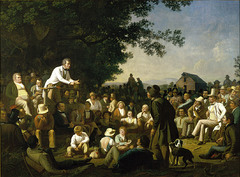
Stump Speaking

answer
when political candidates campaigning from town to town would stand upon a sawed off tree stump to deliver a speech
question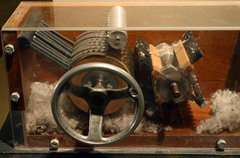
Cotton Gin

answer
a machine that quickly and easily separates the cotton fibers from the seeds; invented by Eli Whitney
question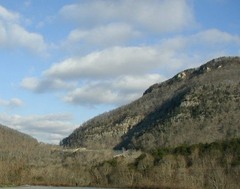
Cumberland Gap

answer
a pass through the Cumberland Region of the Appalacian Mountains between Virginia and Kentucky that early settlers used in order to move west
question
Utopianism
answer
the political orientation of a person who believes in impossibly idealistic schemes social perfection
question
Romanticism
answer
a movement in literature and art that celebrated nature rather than civilization
question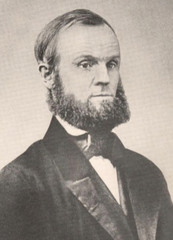
John Humphrey Noyes

answer
founded the Oneida Community
question
Communitarian Movement
answer
A social and political movement of academics
question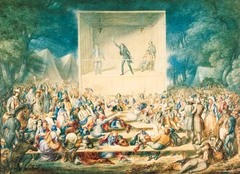
The Second Great Awakening

answer
Wave of religious revivals around 1800 that encouraged a culture of evangelicalism responsible for an upswing in prison reform, the temperance cause, the feminist movement, and abolition.
question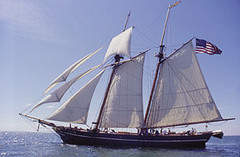
The Amistad Incident

answer
53 Africans were kidnapped from West Africa and sold into the transatlantic slave trade; they were then purchased illegally by Spanish planters Jose Ruiz and Pedro Montez
question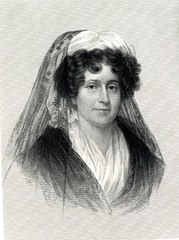
Emma Willard

answer
• Early supporter of women's education, in 1818 • She opened her own girls' school, the Troy Female Seminary in 1821
question
Susan B. Anthony

answer
prominent American civil rights leader who played a pivotal role in the 19th century women's rights movement to introduce women's suffrage into the United States
question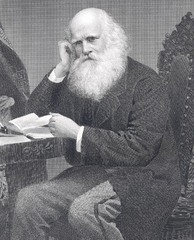
William Cullen Bryant

answer
wrote poetry including "Thanatopsis."
question
Henry David Thoreau

answer
• spent two years living in the woods off of nothing but what he could make, grow, or trade for • wrote the classic Walden: Or Life in the Woods
question
Ralph Waldo Emerson
answer
• most famous Transcendentalist • former Unitarian pastor turned writer and lyceum speaker • most famous writing/speech was Self Reliance which stressed individualism • Transcendentalist with the credentials, success, and the "big name"
question
Walt Whitman

answer
• poet who wrote Leaves of Grass • encouraged people to live their lives to the fullest
question
Henry Wadsworth Longfellow

answer
immensely popular poet with "Evangeline," "The Tales of Hiawatha," and "The Courtship of Miles Standish."
question
John Greenleaf Whittier

answer
wrote poems that barked against social injustice like slavery
question
James Russell Lowell

answer
similarly wrote satirical poetry that criticized social wrongs, such as Biglow Papers
question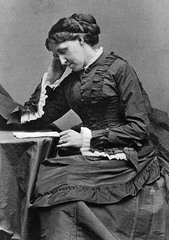
Louisa May Alcott

answer
grew up in Transcendentalist Concord, Mass. and wrote Little Women
question
Emily Dickinson
answer
wrote love poems, also in Massachusetts
question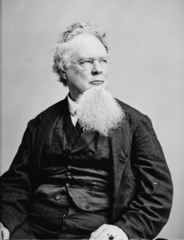
William Gillmore Simms

answer
"the Cooper of the South;" wrote of southern life during the American Revolution
question
Edgar Allan Poe
answer
credited with inventing the "psychological thriller;" often dealt with the ghostly and the macabre
question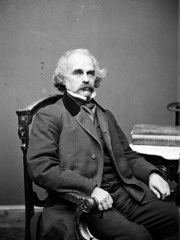
Nathaniel Hawthorne

answer
explored the idea of original sin wit works such as The House of Seven Gables and The Scarlet Letter
question
Herman Melville

answer
wrote Moby Dick, the allegorical tale of good vs. evil
question
George Bancroft
answer
helped found the Naval Academy in Annapolis, MD and his history of the U.S. earned him the title of "Father of American History."
question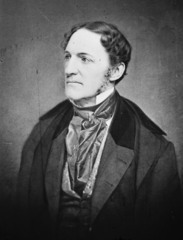
William H. Prescott

answer
wrote histories detailing the conquests of Mexico and Peru
question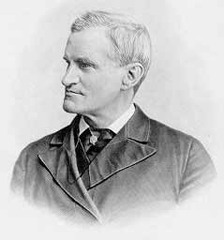
Francis Parkman

answer
wrote the history of England and France's struggle for control of North America
question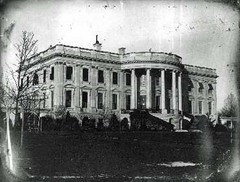
Election of 1828

answer
Jackson defeats John Quincy Adams in this election, becoming the 7th President
question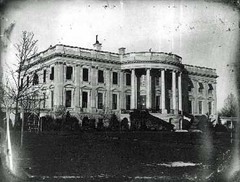
Election of 1832

answer
• Jackson vs Clay • Jackson wins • First time a third party was in an election, the Anti-Masonic party
question
hodgepodge
answer
Composed of a mixed mass of diverse elements or groups
question
mediation
answer
A friendly intervention, usually by consent, to settle differences between groups or nations
question
armistice
answer
A temporary stopping of warfare by mutual agreement, usually in preparation for an actual peace negotiation between the parties
question
nationalism
answer
A strong devotion to the nation as the central political entity, often in a narrow or aggressive fashion
question
reaction (reactionary)
answer
In politics, extreme conservatism, looking to restore the conditions of an earlier time
question
protection (protective)
answer
In economics, the policy of stimulating or preserving domestic producers by placing barriers against imported goods, often through high tariffs
question
raw materials
answer
Products in their natural, unmanufactured state
question
internal improvements
answer
The basic public works, such as roads and canals, that create the structure for economic development
question
intrastate
answer
Existing wholly within a state of the United States
question
depression
answer
In economics, a severe and often prolonged period of declining economic activity, rising unemployment, and falling wages and prices
question
boom
answer
In economics, period of sudden, spectacular expansion of business activity or prices
question
peculiar institution
answer
The institution of American black slavery
question
demagogic (demagogue)
answer
Concerning a leader who stirs up the common people by appeals to emotion and prejudice, often for selfish or irrational ends
question
contract
answer
In law, an agreement in which each of two or more parties agrees to perform some act in exchange for what the other party promises to do
question
Macon's Bill No. 2
answer
opened trade with Britain and France, said if either nation repealed its restrictions on neutral shipping the US would halt trade with the other; plan didn't work



